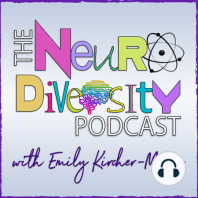37 min listen
Newly Diagnosed at Age Forty-Something
ratings:
Length:
39 minutes
Released:
Apr 6, 2023
Format:
Podcast episode
Description
It’s common today for people to be diagnosed as neurodivergent as an adult, having survived childhood without the recognition or support that may have come along with a diagnosis. Our guest lived that experience. Carolyn Kiel is the host of the Beyond 6 Seconds podcast, and she joins Emily to talk about her life as an autistic woman. What are the hurdles and barriers to getting an autism diagnosis? Does a diagnosis even matter once you’re an adult? How can looking back at your childhood from that new perspective change the way you think about the world? It’s episode 166, and it’s part of our special series during April, Autism Acceptance Month. This episode is brought to you by SPACE - Supportive Parenting for Anxious Childhood Emotions. To register for SPACE, submit your information through this portal. For more details go to Neurodiversity University. Join the Neurodiversity Podcast Advocacy and Support Group on Facebook! ABOUT THE GUEST Carolyn Kiel is an experienced instructional designer of employee training programs. On her award-winning podcast, Beyond 6 Seconds, she features neurodivergent entrepreneurs, creatives and advocates who shatter misconceptions, break stigma, and showcase the diversity of the neurodivergent community. Carolyn has a Bachelor of Arts in Psychology from Vassar College and a Master of Arts in Industrial/Organizational Psychology from Fairleigh Dickinson University. BACKGROUND READING Website Instagram Twitter LinkedIn Facebook YouTube
Released:
Apr 6, 2023
Format:
Podcast episode
Titles in the series (100)
The Importance of Empathy | IQ | Bullying | Intelligence | Gifted: Emily Kircher-Morris explores the concept of empathy with Dr. Michele Borba, author of the book “End Peer Cruelty, Build Empathy: The Proven Six Rs of Bullying Prevention That Create Inclusive, Safe, and Caring Schools.” They discuss ways to help... by Neurodiversity Podcast
